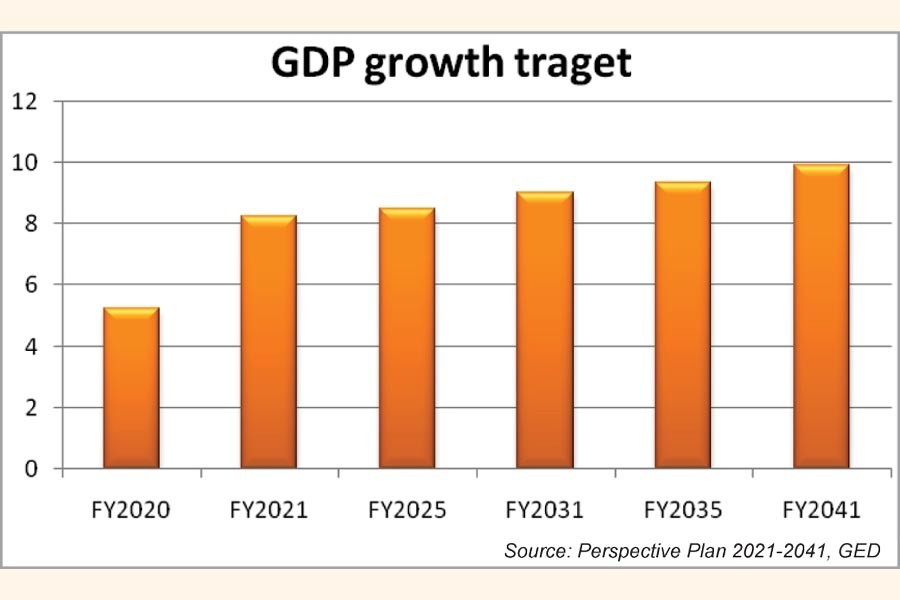The government has shifted from its earlier stance of achieving double-digit economic growth to a more realistic approach in the newly-devised vision paper by FY2041, analysts said on Saturday.
Yet, the government has taken an ambitious 9.02 per cent economic growth rate target on an average between FY2021 and FY2041.
In the newly-prepared Perspective Plan (PP) FY2021-FY2041, the government has taken a target to achieve 9.90 per cent gross domestic product (GDP) growth in the terminal year of FY2041.
In the last plan from FY2011 to FY2020, the government set a target to achieve double-digit growth in the terminal year, which was not achieved.
According to the new plan, the government wants to achieve an upper-middle income country status by FY2031 and high income country status by FY2041.
For meeting the target, the economy has to be expanded at an average of 9.02 per cent rate during the 20 years period, the paper said.
Economists termed the target ambitious and challenging amid the present base of Bangladesh's economic scenario, especially its poor investment to GDP ratio.
The government wants to lift the Gross national Income (GNI) per capita to US$3,271 in FY2025, $5,906 in FY2031 and $17,229 in FY2041.
The Bangladesh Bureau of Statistics (BBS), in its latest estimate, has showed that Bangladesh's GNI per capita was $2,064 in FY2020.
Economist Dr Ahsan H. Mansur told the FE on Saturday that the average 9.02 per cent growth rate target in the next 20 years was ambitious.
"The investment base is very poor. With this investment scenario, it's not possible at all to attain the target. The country will have to raise its investment base."
For this, heavy regulatory reforms, quality physical and human capital productivity, competitive business environment for local and foreign entrepreneurs are inevitable for the investment scenario, said Dr Mansur, also the Executive Director of a local think-tank Policy Research Institute (PRI) said.
He said: "China had been growing at more than 10 per cent rate and its investment-GDP ratio was more than 50 per cent over more than a decade. So, the country is now on track to be a developed nation."
Bangladesh also needs to follow the 'Look East' policy in its development paradigm rather mimicking the western countries, he said.
Dr Mansur said the government should follow China, South Korea or Singapore's development strategy, rather following those of slow-growing India or any western countries.
Former World Bank lead economist Dr Zahid Hussain echoed Dr Mansur's views, saying the target is ambitious and challenging with the weak base of Bangladesh's regulatory and infrastructure.
"If you just follow the bureaucratic tangle here, then you will get the answer. For example, the government has approved one single window law for getting all the services in one place for the investors more than two years ago. But if you want to get even electricity connection now, it's not possible from one single place.
You will see lot of examples like this," he said.
However, he said there are some new opportunities have been created for Bangladesh now.
"The demand for new products like healthcare and software and equipment has been created globally. Bangladesh can grab the market share as it has a better infrastructure to produce those," he added.
Referring to the UNCTAD report, Dr Hussain said although FDI could plunge 40 per cent across the world due to COVID pandemic, global investment restructuring could help Bangladesh attract investments improving business climate.


